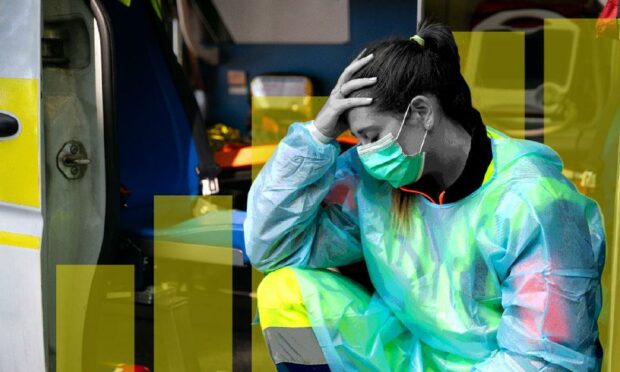Paramedics are suffering from a wave of mental health-related illness as Scotland’s stretched ambulance service struggles to cope with demand.
New figures, released under freedom of information laws, confirm the number of absences related to stress, anxiety, depression, or other psychiatric illness, has already hit a new high this year.
Data for January to September shows that 216 paramedics have been off work as a result of such illness.
The total figure for the last nine months is higher than the number of absences in any of the previous five years, and is almost certain to rise further before the end of 2021.
It is already more than three times the 67 paramedics who were absent due to mental health-related illness in 2016.
‘Deeply worrying’
Scottish Labour’s health spokeswoman Jackie Baillie said: “These figures lay bare a mental health crisis in Scotland’s ambulance services.
“The number of paramedics taking time off due to mental health issues is deeply worrying, especially with the service under extreme pressure.”
The Scottish Ambulance Service has been in turmoil in recent months amid unprecedented pressures that have led to patients often waiting for hours to receive help, sometimes with tragic consequences.
Health Secretary Humza Yousaf, who has outlined measures to try to ease the pressure, has said it is largely due to the Covid pandemic.
He also blamed a combination of increasingly complex cases, delayed demand and exceptionally busy emergency departments.
Regional breakdown
The figures from the ambulance service show that by September there were 84 paramedics who had been absent due to mental health issues in the “east” division, which includes Tayside and Fife.
This was just two short of the 86 recorded for the whole of 2020, and significantly higher than the 68 in 2019, the 55 paramedics in 2018, the 38 in 2017, and 23 in 2016.
In the “north” region – which covers Grampian and the Highlands and Islands – there had been 22 paramedics off sick under the same category of illness, by September.
This compares to 24 for the entire 2020, as well as 21 in 2019, a total of 19 in 2018, and 12 in both 2017 and 2016.
The largest jump this year, so far, has been in the “west” division, where 88 paramedics have been absent – up from 75 last year, 66 in 2019 and 20 in 2016.
Some of the paramedics will have been off work under this category in more than one year.
The number of paramedics in Scotland has increased from 1,426 in 2016 to 1,752 this year.
We are extremely aware of the current demands our staff are experiencing and they are working incredibly hard under sustained pressure as they help patients and save lives every day.”
A spokeswoman for the Scottish Ambulance Service said: “We are extremely aware of the current demands our staff are experiencing and they are working incredibly hard under sustained pressure as they help patients and save lives every day.
“Their wellbeing is one of our top priorities and we are doing everything we can to support them through a range of health and wellbeing measures.
“We are also continuing to recruit, train and develop new ambulance staff across the country to provide additional capacity going forward.”

